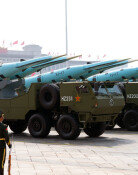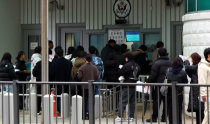Pressure Rising Over Exit Strategy, Rate Hike
Pressure Rising Over Exit Strategy, Rate Hike
Posted April. 27, 2010 21:37,
Pressure is rising on both the government and the Bank of Korea over implementation of an exit strategy from economic stimulus measures, namely an interest rate hike.
The governments argument that an exit strategy is premature is less convincing amid growing voices urging a rate hike at home and abroad, with some urging an exit strategy at the Group of 20 meeting of finance ministers and central bank chiefs in Washington last week.
Strategy and Finance Minister Yoon Jeung-hyun, however, warned of the side effects of low interest rates, causing the market to forecast that Seoul is close to implementing the exit strategy sooner than expected.
○ Will the government change its stance?
At a meeting with foreign correspondents in Washington Sunday, Yoon said, The financial crisis was triggered by excessive liquidity stemming from low interest rates, and we are addressing the crisis once again with low interest rates, which could give rise to another crisis.
Conspicuous in his comments is how he mentioned the pitfalls of a low interest rate policy despite saying raising interest rates would be premature. Just two days earlier, he had said, The implementation of an exit strategy is something for discussion at the G20 summit in November.
With the increasing importance of an exit strategy depending on each countrys situation at the G20 finance ministers meeting, Yoon said the governments negative take on implementing it could change.
Coordination of exit strategy was the focus at the G20 finance ministers meeting in November last year. They said in their latest meeting in Washington that economic recovery is occurring at different speeds in different regions and countries, so each country needs its own appropriate exit strategy.
Immediately after his appointment as finance minister last year, Yoon told The Dong-A Ilbo in an interview, Low interest rates give rise to a crisis. His Sunday comments, however, apparently shows an about face in highlighting the side effects of super-low interest rates for discussion, an issue he has refrained from mentioning though conscious of it.
○ Tarnished intl cooperation
The two main reasons behind the claim are that aversion to a rate hike as premature was a wait-and-see approach until tangible growth in the private sector was found and Koreas international cooperation as a G20 chair country. Both arguments are flawed, however.
Most countries including Korea have begun exit strategies in financial policy. India has raised its benchmark interest rate for the second consecutive month. Australia has also increased its benchmark rate five times since October last year, and Canada, the host of the G20 summit in June, is forecast to raise its interest rate in the first half of this year.
The private sector is also talking of a rate increase. Korea Economic Research Institute under the Federation of Korean Industries said a timing of a hike must be pushed up. The Korea Development Institute said last month that the rate must be raised now.
Other experts say Korea should have raised the rate in the first quarter.
jaeyuna@donga.com jaeyuna@donga.com







